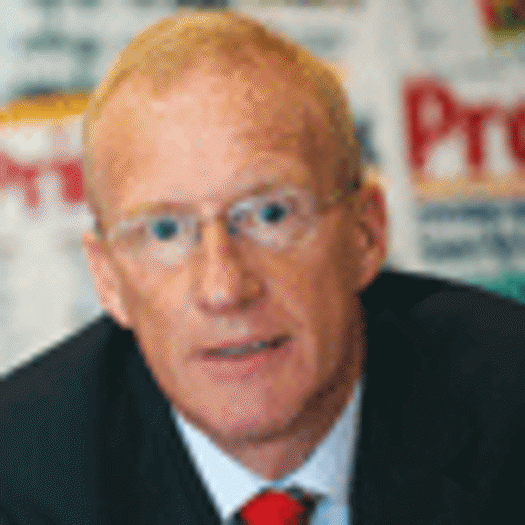Peter Morris is managing director of UK post-press equipment supplier Friedheim International and after 47 years in the print industry, there's not much he doesn't have an insight on, from training, partnerships and the unstoppable march of automation in the industry.
How are you feeling about the show right now?
I'm optimistic. In the run-up, there was a lot of pessimism about the exhibition. Three months ago, I could hardly find anyone who even knew it was taking place, but about a month ago the momentum really started and now I can't find anyone that hasn't said that they're coming.
And the other exhibitors I've spoken to are saying the same thing. The printing industry cannot put off investing anymore - there have been some pretty lean times lately, but they just can't afford to wait any longer.
So you think the time is right for printers to invest. Do you think that will continue the drive to automation?
When it comes to automation, in the conventional offset sector it's not a problem; those that want it have it, but in our experience 90% of conventional printers don't really want full automation. But where the real opportunity is, for us and printers, is in the industrial finishing of digital print.
When you have these high-speed machines, whether it's toner or inkjet, you cannot get away from the fact that there's a real need for finishing kit in the same vein. If someone invests millions in a digital press, then they need finishing kit that can cope and we're well placed for that.
You've always spoken passionately concerning the deskilling of the print industry. Is that a lost battle now?
Absolutely. It's a shame, but the industry is not prepared to invest in training so the deskilling of print will continue. The onus is now on the machinery manufacturers to replace the skilled operator with automation. It doesn't matter what anyone tells you, training in the industry just doesn't take place. Sure there are one or two exceptions, but generally speaking it's the case.
I can understand it, after all a lump of highly automated metal isn't going to walk out of the door for £5 an hour more, but it's a real shame. Suppliers and manufacturers are in the business of selling machinery; it's not our role to train the industry - we can only do what our customers ask us to do, and that's develop more highly automated kit.
Aside from training though, how is the market? Are you starting to see optimism return to printers?
Our order intake in April was the best since October 2008, and that's right in front of the show and I'm expecting a phone call later today that will tell me we've already surpassed in May what we did in April. So yes, the market is definitely picking up. All the printers tell me that they're busy.
You have a partnership with post-press kit manufacturer Duplo, where you sell each others' machines, and there seems to have been a swathe of similar tie-ups unveiled already at the show. Do you think we'll see a lot more of those types of deals from manufacturers and suppliers and are they good news for printers?
I think those kinds of deal are driven by a poor market. For us, for example, it effectively gave us another eight salesmen, and then there's the benefit of cross-selling and getting our respective products in front of customers we may not have a relationship with - it's a no-brainer really. I think if they are handled well they are good for everyone - the partners and, importantly, the printers.
In your case, then, do you think it increases the likelihood of a formal merger between Friedheim and Duplo?
If this relationships works, then there are a lot of opportunities for synergies. Like us, Duplo sees the ‘bigger picture' - it's not just about selling the odd guillotine or collator here or there.
Is that a yes or a no then?
No, it wouldn't happen. I think the partnership will get stronger, but you can have sex without getting married.
On the subject of partnerships, after taking on the Wohlenberg agency in the UK late last year, you now sell both that company and Schneider's guillotines. How does that work as, surely, they're rival machines?
Outside of the 1,150mm format there's no crossover in products at all really, so it's not a problem. It's a natural fit that gives us a wider range and also access to all the Baumann handling equipment. So it's a good deal for us, a good deal for them and a good deal for our customers.
But the deal also meant that you entered the perfect-binding market, something you've always said didn't interest you because it was so price competitive?
That's true and it still is very tough, but the Wohlenberg machines sit very neatly in the market. The machines are a mid-price, midrange and mid-speed, but they have lots of features as well as a smaller footprint than many of their rivals, so you can shoehorn one into places that other machines just wouldn't fit into. This all means that they have a unique appeal and they're nice machines to have in our range. But we never want to be in saddlestitching, I can tell you that.
Getting back to Ipex, do you think there's still room in the market for the show and Drupa?
Yes, simply because this is the biggest English-speaking graphic arts show and, unless I'm wrong, there are more people that speak English than German.
What do you think Ipex 2010 will be remembered for?
I really hope and pray it will be seen as the turning point for the print industry after so many months of doom and gloom. I don't think it will be a ‘lights on' moment, but I think that, when we look back in a few months' time, we'll be able to say that Ipex happened when the industry started to heal itself. Perhaps it will be known as the fightback show. The printing industry needs to fight back and it needs to do it sooner rather than later.










